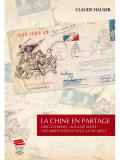Ding Zuoshao (1902–1990) from China and Auguste Viatte (1901–1993) from Switzerland met and became friends in Paris in 1930. Ding had received French Jesuit education in Shanghai and was completing a doctorate in law at the Sorbonne, and Viatte was fresh from a journey to Asia, which included China, the object of his youthful admiration. Although their life paths soon diverged, they maintained a long correspondence, which, despite being interrupted for several years, continued almost until the end of Ding’s life. Viatte had become a professor of French literature in Canada and later in Switzerland, where he returned in 1952. Ding, a political activist within the Nationalist Party of Chiang Kai-shek, crisscrossed China in efforts to mobilize resistance to the Japanese occupation in the 1930s and thereafter fought the Chinese Communists, before evacuating to Taiwan in the mid-1950s. In this short, handsomely produced book, Claude Hauser has written an engaging history of the two men’s intellectual exchange.
The book is arranged chronologically, and mainly proceeds by quoting the two correspondents and putting their ideas and actions into historical context. Although Viatte’s letters to Ding are missing, his opinions are reconstructed from regular commentary on current affairs in Europe and the Far East, which the Swiss academic published in the French press, as well as from his books on the political situation in East Asia, and records in his private journal. Through Viatte’s writing, we follow the evolution of the French public’s perspectives on China, along with changing views on the promises and menaces of Fascism, Nazism and Communism. With Ding, we become immersed in Chinese political debates of the 1930s, the war of resistance against Japan and the civil war between Nationalists and Communists. The self-styled «fervent nationalist» Ding and the conservative Catholic Viatte, a Swiss-born devotee of French greatness and champion of Francophonie, shared anti-Communist convictions even as they disagreed about the other totalitarian ideologies and regimes of their time: in the 1930s, Ding considered dictatorship desirable for China, and sympathized with Hitler.
The book focuses firmly on international relations, with an emphasis on China. Hauser, who is not a sinologist, has done a careful job of informing himself about twentieth-century Chinese history and cites a large array of studies on China in French and English (there are only a few slips: a garbled reference to a Chinese publication on p. 25; and General Ma Zhanshan being wrongly called “Ma Shanzhan” on p. 33). His summaries of the larger developments – the complex background to Ding Zuoshao’s turbulent career – will serve the general reader, while specialists may also find something new in the account of the little-known «lost army». Chapter Four deals with the creation and failure of this army, a small military force of the Republic of China, which continued to harass the newly established Chinese Communist state from the border of Burma with Yunnan province until 1954 with the support of the United States. At the time, Ding wrote about his utopian hopes for toppling Communism in China with the help of all freedom-loving nations, or through renewal of the World War, which would rob the Communists in Beijing of their protectors in Moscow.
In the course of their epistolary relationship, Ding often sought to use Viatte as a channel to propagate his beliefs on the political situation in China through the French press. For his part, without replicating Ding’s most farfetched and radical statements, Viatte utilized his private source of information («mon ami chinois») to enhance his own authority as an expert commentator on politics in Asia at a time when France was fighting a war in Indo-China, and also to promote his agenda: the urgent necessity of resisting Communism anywhere in the name of universal moral values. With Viatte’s encouragement and his active editorial involvement, Ding began to write a participant’s memoir, entitled L’armée perdue, while he was a refugee in Thailand. Completed after Ding’s relocation to Taiwan in 1957, the original manuscript found no publisher in France (in 1975, parts of it were eventually incorporated into a fictionalized report from Taiwan by a French journalist). Hauser rightly regards it as an important product of cross-cultural collaboration.
In sum, La Chine en partage is an interesting and well researched book. The story it tells of Chinese-European contacts among right-wing intellectuals has received less atten tion from historians than have comparable transnational connections within the left. It can therefore be recommended especially to scholars of twentieth-century conservative political thought. Outside of academia, it will appeal to readers with interests in modern China and intellectual biography.
Zitierweise:
Gamsa, Mark: Rezension zu: Hauser, Claude: La Chine en partage. Ding Zuoshao – Auguste Viatte: une amitié intellectuelle au XXe siècle, Neuchâtel 2018. Zuerst erschienen in: Schweizerische Zeitschrift für Geschichte 70 (1), 2020, S. 153-154. Online: <https://doi.org/10.24894/2296-6013.00054>.
